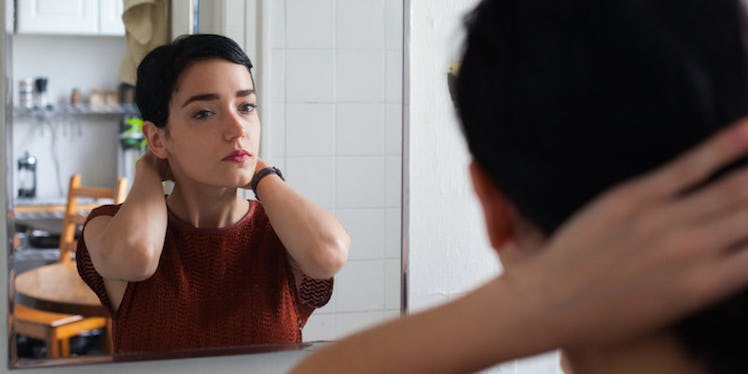
How I Overcame Body Dysmorphic Disorder In The Age Of The Selfie
In middle school, my teacher announced we all had to participate in a renewal of our school photos.
This sent a surge of panic through my body.
There was no way in hell I could cope with seeing a photo of myself that I had absolutely no control over.
I couldn't alter the angle, dim the lighting, nothing.
For someone who had to shower in the dark every morning, this was my absolute worst nightmare.
My teacher asked if anybody had any questions.
I nervously raised my hand, asking whether the picture was mandatory for every student.
My teacher replied, "Yes," in a tone that suggested she was curious about why someone would ask such an obvious question.
I burst into tears, declaring I was too ugly to be photographed.
My classmates comforted me, telling me not to be so silly.
They said I was beautiful.
But I went on dreading said photo day, saddened that my classmates had to lie to me to try to make me feel better about my hideous exterior.
Within a few days, my teacher had spoken to the school nurse.
She then called my mom and referred me to a therapist.
I had never heard of body dysmorphic disorder (BDD) before I turned 15.
I believed my thoughts about my appearance were completely legitimate.
I was ugly, and that's all there was to it.
I did my best to deal with it by taking the necessary precautions: making no eye contact with any mirror unless it was in dimmed lighting, showering in the dark with a full face of fresh makeup and never appearing in any photographs.
Coming out of the first therapy session with my mom by my side, I was shocked there was something wrong with my mental health.
There was an actual name for the way I felt and dealt with my ugliness.
Body dysmorphic disorder sounded so odd.
How could it be seen as irrational for an ugly person like me to not want to be in photos and brightly lit changing rooms for fear of seeing my reflection?
My therapist was a sweet lady.
She explained to me that such an illogical disorder was making me need to control certain elements of my life in order to relieve feelings of anxiety.
The thought process I was having while being complimented was also being altered by body dysmorphic disorder.
In my therapist's words, a compliment (a circle) was converting to what I thought was an act of pity (a square).
Once I came to terms with my illogical thoughts through the help of my therapy sessions, I began to get better.
I even took a selfie.
I actually started believing the compliments were true.
Years later, I knew I looked quite nice.
However, something was still bothering me.
I had gotten over my body dysmorphic disorder by hiding behind my glasses.
They were a security blanket. My ugliness was hidden behind them.
They had the power to make me look like a "hot secretary" (as some had said to me in the past while trying to get into my pants).
They were the key to my good looks.
One day, I realized just how absurd this was.
How can a pair of glasses make me better-looking?
Something had to change.
I had worn glasses half my life, so there was going to be some getting used to my naked face in the mirror.
Last year, I dived into the deep end.
I knew that if I made myself wear contact lenses, I would go straight back to my glasses for comfort and familiarity.
So, I got laser eye surgery.
After an hour of walking into the opticians, I had perfect, 20-20 vision.
Recovery was horrendous for a few days. My eyes felt like I had grit stuck in them.
I was unable to touch them and unable to wear any makeup.
The makeup — as you may have guessed — was another safety blanket.
As I looked at my bloodshot eyes and newly naked face, unfortunate and unwelcome anxiety creeped back in again.
This time, it hit me so hard that planning to leave the house had me in floods of tears.
With lovely support from family, I realized I needed to embrace the new face and remember exactly why I had the procedure done in the first place.
Not only did I have perfect vision, but I also gave the finger to the body dysmorphic disorder.
I would not let it continue to persuade me that only glasses would make me pretty.
Nothing and no one will make me feel ugly again (with the exception of a heavy night of drinking), and that's fine by me.